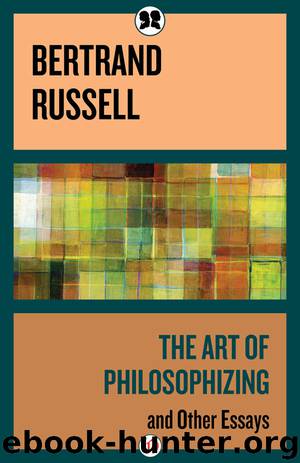The Art of Philosophizing by Bertrand Russell

Author:Bertrand Russell [Russell, Bertrand]
Language: eng
Format: epub
Publisher: Philosophical Library/Open Road
Published: 2013-10-08T04:00:00+00:00
The Art of Reckoning
We live in a technical civilization, of which most of us understand very little. Why does electric light go on when you press the switch? Why is it cold in the ice-box? How do airmen take aim at a target from a fast-moving aeroplane? What enables astronomers to predict eclipses? On what principles do insurance companies decide what to charge? These are all very practical questions; unless some one knew the answer, we could not enjoy the comforts upon which we are wont to pride ourselves. But those who know the answers are few. Usually these few invent a rule or a machine which enables other people to get on with very little knowledge; a practical electrician does not have to know the theory of electricity, though this was necessary for the inventions which he knows how to manipulate. If you want to be able to answer such every-day questions, you have to learn many things; the most indispensable of these is mathematics.
Some people will always dislike mathematics, however well they may be taught. They ought not to try to become mathematicians, and their teachers ought to let them off after they have proved their inefficiency over the rudiments. But if mathematics were properly taught, there would be very much fewer people who would hate it than there are at present.
There are various ways of stimulating a love of mathematics. One is the method unintentionally adopted by Galileo’s father, who was himself a teacher of mathematics, but found himself unable to make a living by his profession. He determined that his son should do something more lucrative, and with that end in view concealed from the youth the very existence of mathematics. But one day—so the story goes—the boy, now 18 years old, happened to overhear a lecture on geometry which was being given by a man in the next room. He was fascinated, and within a very short time became one of the leading mathematicians of the age. However, I doubt if this method is quite suitable for adoption by educational authorities. I think perhaps there are other methods that are likely to be more widely successful.
In the early stages, all teaching of mathematics should start from practical problems; they should be easy problems, and such as might seem interesting to a child. When I was young (perhaps things have not changed in this respect) the problems were such as no one could possibly wish to solve. For instance: A, B, and C are travelling from X to Y. A on foot, B on a horse, and C on a bicycle. A is always going to sleep at odd moments, B’s horse goes lame, and C has a puncture. A takes twice as long as B would have taken if his horse hadn’t gone lame, and C gets there half an hour after A would have got there if he hadn’t gone to sleep—and so on. Even the most ardent pupil is put off by this sort of thing.
Download
This site does not store any files on its server. We only index and link to content provided by other sites. Please contact the content providers to delete copyright contents if any and email us, we'll remove relevant links or contents immediately.
The Rules Do Not Apply by Ariel Levy(4957)
Bluets by Maggie Nelson(4547)
Too Much and Not the Mood by Durga Chew-Bose(4337)
Pre-Suasion: A Revolutionary Way to Influence and Persuade by Robert Cialdini(4219)
The Motorcycle Diaries by Ernesto Che Guevara(4089)
Walking by Henry David Thoreau(3952)
Schaum's Quick Guide to Writing Great Short Stories by Margaret Lucke(3373)
What If This Were Enough? by Heather Havrilesky(3308)
The Daily Stoic by Holiday Ryan & Hanselman Stephen(3299)
The Day I Stopped Drinking Milk by Sudha Murty(3194)
The Social Psychology of Inequality by Unknown(3018)
Why I Write by George Orwell(2944)
Letters From a Stoic by Seneca(2790)
A Short History of Nearly Everything by Bryson Bill(2689)
A Burst of Light by Audre Lorde(2597)
Insomniac City by Bill Hayes(2545)
Feel Free by Zadie Smith(2476)
Upstream by Mary Oliver(2388)
Miami by Joan Didion(2364)
